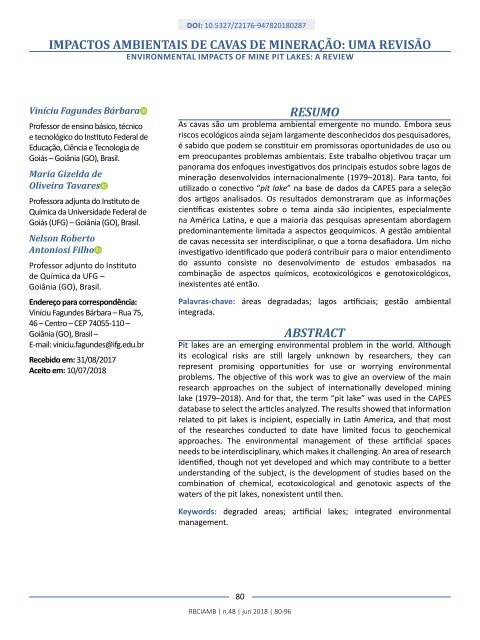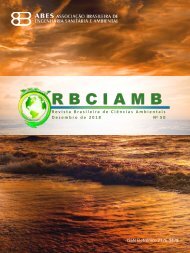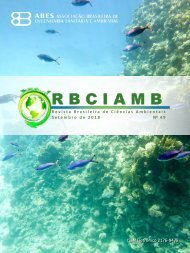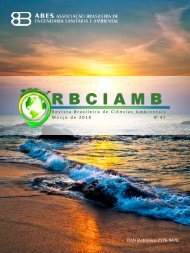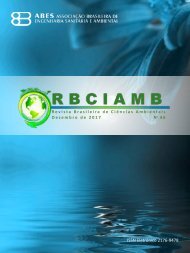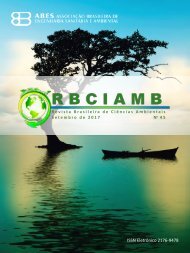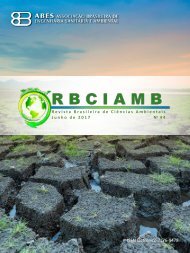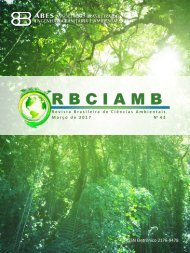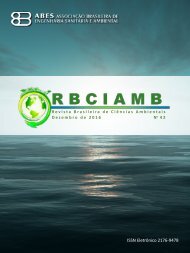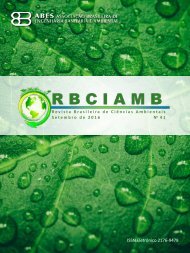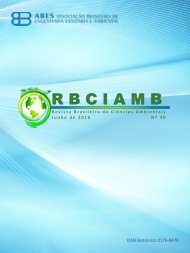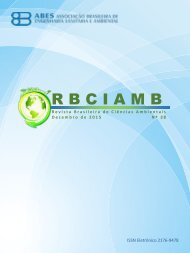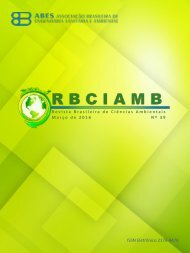Edição 48 RBCIAMB
Create successful ePaper yourself
Turn your PDF publications into a flip-book with our unique Google optimized e-Paper software.
DOI: 10.5327/Z2176-947820180287<br />
IMPACTOS AMBIENTAIS DE CAVAS DE MINERAÇÃO: UMA REVISÃO<br />
ENVIRONMENTAL IMPACTS OF MINE PIT LAKES: A REVIEW<br />
Viníciu Fagundes Bárbara<br />
Professor de ensino básico, técnico<br />
e tecnológico do Instituto Federal de<br />
Educação, Ciência e Tecnologia de<br />
Goiás – Goiânia (GO), Brasil.<br />
Maria Gizelda de<br />
Oliveira Tavares<br />
Professora adjunta do Instituto de<br />
Química da Universidade Federal de<br />
Goiás (UFG) – Goiânia (GO), Brasil.<br />
Nelson Roberto<br />
Antoniosi Filho<br />
Professor adjunto do Instituto<br />
de Química da UFG –<br />
Goiânia (GO), Brasil.<br />
Endereço para correspondência:<br />
Viníciu Fagundes Bárbara – Rua 75,<br />
46 – Centro – CEP 74055‐110 –<br />
Goiânia (GO), Brasil –<br />
E-mail: viniciu.fagundes@ifg.edu.br<br />
Recebido em: 31/08/2017<br />
Aceito em: 10/07/2018<br />
RESUMO<br />
As cavas são um problema ambiental emergente no mundo. Embora seus<br />
riscos ecológicos ainda sejam largamente desconhecidos dos pesquisadores,<br />
é sabido que podem se constituir em promissoras oportunidades de uso ou<br />
em preocupantes problemas ambientais. Este trabalho objetivou traçar um<br />
panorama dos enfoques investigativos dos principais estudos sobre lagos de<br />
mineração desenvolvidos internacionalmente (1979–2018). Para tanto, foi<br />
utilizado o conectivo “pit lake” na base de dados da CAPES para a seleção<br />
dos artigos analisados. Os resultados demonstraram que as informações<br />
científicas existentes sobre o tema ainda são incipientes, especialmente<br />
na América Latina, e que a maioria das pesquisas apresentam abordagem<br />
predominantemente limitada a aspectos geoquímicos. A gestão ambiental<br />
de cavas necessita ser interdisciplinar, o que a torna desafiadora. Um nicho<br />
investigativo identificado que poderá contribuir para o maior entendimento<br />
do assunto consiste no desenvolvimento de estudos embasados na<br />
combinação de aspectos químicos, ecotoxicológicos e genotoxicológicos,<br />
inexistentes até então.<br />
Palavras-chave: áreas degradadas; lagos artificiais; gestão ambiental<br />
integrada.<br />
ABSTRACT<br />
Pit lakes are an emerging environmental problem in the world. Although<br />
its ecological risks are still largely unknown by researchers, they can<br />
represent promising opportunities for use or worrying environmental<br />
problems. The objective of this work was to give an overview of the main<br />
research approaches on the subject of internationally developed mining<br />
lake ( 1979– 2018). And for that, the term “pit lake” was used in the CAPES<br />
database to select the articles analyzed. The results showed that information<br />
related to pit lakes is incipient, especially in Latin America, and that most<br />
of the researches conducted to date have limited focus to geochemical<br />
approaches. The environmental management of these artificial spaces<br />
needs to be interdisciplinary, which makes it challenging. An area of research<br />
identified, though not yet developed and which may contribute to a better<br />
understanding of the subject, is the development of studies based on the<br />
combination of chemical, ecotoxicological and genotoxic aspects of the<br />
waters of the pit lakes, nonexistent until then.<br />
Keywords: degraded areas; artificial lakes; integrated environmental<br />
management.<br />
80<br />
<strong>RBCIAMB</strong> | n.<strong>48</strong> | jun 2018 | 80-96


